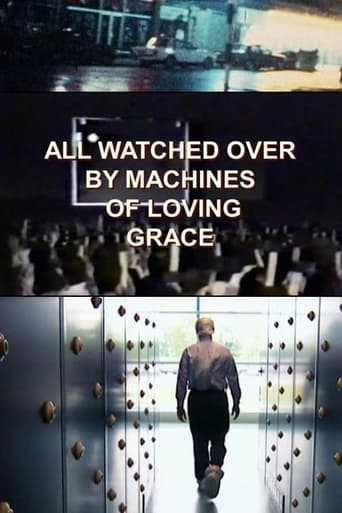Lance Le
Bombarded with images, sounds, and ideas that at times overgeneralizes and in other instances create bizarre connections, Curtis's documentary is deceptive, its true purpose buried in impressive editing and storytelling. This documentary is not actually a documentary, but is a story about how stories take on lives of their own and infect the imaginations of many human beings, especially those whose influence on the world makes the infections all the more dangerous.Flitting from idea to idea, Curtis weaves a narrative by linking somewhat disparate topics and attempts to convince us, the viewers, that his story is true. The world has been manipulated by an elite via computer networks. The idea of a balance in nature contributes to our misguided attempts at understanding nature. We become machines ourselves in the subjugation and erroneous divisions of colonized territories. But ah, these are just stories.Be careful of stories and ideas, Curtis warns, for they have a habit of dictating reality. In presenting us a somewhat plausible explanation of various events in recent history, he presents a story that may or may not be wholly factual, but satisfies that conspiracy theorist lurking underneath us all. The possibility of us accepting a "story" for "fact" is perhaps the essential point of this documentary. So when viewing All Watched Over, be mindful of that you are watching is simply a narrative about how narratives, if taken too religiously, could have terrible consequences.
rgcustomer
This miniseries claims to be about machines and how our use of them and misinterpretation of them has not led to the positive results we'd expected.And of course this is true. I majored in Computer Science, and yet my experiences in the "real world" developing and testing computer software have left me wondering whether this is what we, or at least I, ought to be doing, because it doesn't seem to be making anything better, and I can count the lives made worse by the software I worked on (working correctly). So I was perhaps one of the ideal viewers of this program.However, it doesn't seem to really get into the connection between computers and other machines, and the problems we've let them cause. Instead, he takes human failings, and notices that computers don't fix them, and then blames the computers and the thinking that led to them, for the original human problems. He also doesn't seem to give any credit for humans who correct past errors in thinking, which is a function of philosophy and science.The show seems to come off as fuzzily religious. The "villains" famous enough to already be known to the audience tend to be either atheist or frequent targets of religious fanatics. They are made guilty by association with genocide. It's a not-so-subtle propaganda, with the living accused not given any time to respond.Let me just say that the people who carried out the genocide carry the blame themselves. They believed foreigners who told them they were two separate people, despite their own history. They then decided it was OK to wipe each other out. Even if this idea of genocide came from the Belgians, which is unclear to me, they still accepted it and carried it out. That is their own doing, and is on them, nobody else.I've given this a score as high as 6 because I did find the stories of Ayn Rand and Africa to be interesting, aside from the rest of the content. I'll probably seek out more reliable sources to follow up on that information.
Guy
ALL WATCHED OVER MY MACHINES OF LOVING GRACE is a documentary purporting to explain the negative impact of computers and computer thinking on our society. But as this is Adam Curtis making it the result is a documentary that ranges from gorillas in the Congo to Ayn Rand rather than taking a straight A-Z. Unfortunately, in common with much of his other work, despite the sheer breadth of material covered and Curtis's undoubted skills in melding image and music, the actual argument is extremely dubious, poorly argued, lacking in evidence and frequently incoherent.Instead the documentary relies on Curtis's soothing tones (he does the v/o) and constant changes in ideas, music and images, in order to bamboozle the audience. This method of constant change prevents you thinking clearly as your attention is always being called to something else. Once the programme stops and you begin to think about it without the benefit of music, image and voice, you realise just how dodgy the whole argument is.My other usual problem is that, whenever Mr Curtis touches on a subject with which I am familiar, I usually discover he is wrong or at least generalising to a dangerous degree. Thus the entire section on the decolonisation of the Congo basically blames the Belgians and more generally the West for the near immediate collapse of that unhappy country. There is no hint that the inhabitants of the Congo could even think or act for themselves. Curtis paints a picture of local tribes living in perfect pre-European harmony (conveniently forgetting the original inhabitants of the Congo - the pygmies) that is at odds with reality. There are a large number of similar errors. My worry is that, if Curtis is so often wrong when he talks about things that I know well, then is he also wrong about the things I don't know well?The sad thing is that every poor Adam Curtis documentary is an opportunity lost. The BBC has frankly given up on even trying to make documentaries on such complex subjects (even BBC4 is more arts than intellect). And nobody else has access to such a great amount of archive or the funds to really sift through it (hence why you always see the same archive on documentaries).
IonGheorghePetre
I am a fan or Mr. Curtis' previous work but this documentary series was a disappointment for me.The thing I dislike the most is the biased and simple opinion on computers this documentary tries to promote. Apparently "computers" are powerful things that dehumanize our world, we put our faith in computers and they have failed us, completely ignoring the fact that computers are human made, human programmed and human controlled in every aspects. I expected a much more complex and realistic dissection of the topic.This idea is also poorly presented and motivated, for example when briefly talking about the internet, we are presented with the negative opinion of an early internet user, the scene is made in such a way as to suggest that indeed the internet is what that distressed user says. Similar to the cheap techniques a News program would use to influence the public opinion.Throughout the documentary I had the feeling that too much emphasis is put on the soundtrack and on the synchronizing of suggestive footage with music rather than actual relevant content and information.To summarize, "All Watched Over by Machines of Loving Grace" is tendentious, the idea presented is overly simplified and biased. It gave me the impression it was a bad propaganda movie against computers.




